Zoom
Trash
Related: Indigenous Peoples of the world
- Prehistoric
- South America
- Asia
- it's over in a billion years
- Education
- Enterprise

Doomsday planning for less crazy folk. 1.
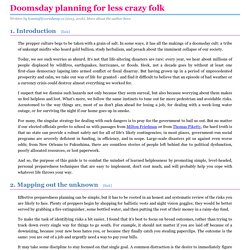
Introduction [link] The prepper culture begs to be taken with a grain of salt. In some ways, it has all the makings of a doomsday cult: a tribe of unkempt misfits who hoard gold bullion, study herbalism, and preach about the imminent collapse of our society. Today, we see such worries as absurd. It's not that life-altering disasters are rare: every year, we hear about millions of people displaced by wildfires, earthquakes, hurricanes, or floods. I suspect that we dismiss such hazards not only because they seem surreal, but also because worrying about them makes us feel helpless and lost. For many, the singular strategy for dealing with such dangers is to pray for the government to bail us out.
Post-scarcity economy. This would require a sophisticated system of resource recycling, in conjunction with advanced productive technology that enables conditions of material abundance, such as automated systems capable of converting raw materials into finished goods[not verified in body], which in turn enable the free distribution[2] of most or all economic output and the common ownership of the means of production used therefor.
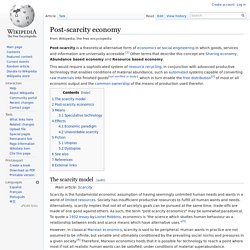
The scarcity model[edit] Scarcity is the fundamental economic assumption of having seemingly unlimited human needs and wants in a world of limited resources. Society has insufficient productive resources to fulfill all human wants and needs. Technocracy Inc. 'I am Trying to Believe': Dystopia as Utopia in the Year Zero Alternate Reality Game. Alexander Charles Oliver Hall Postmodern culture has been marked by a loss of utopian energy that is the result of the cultural dominance of late capitalism.
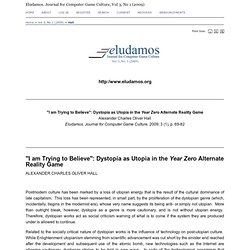
This loss has been represented, in small part, by the proliferation of the dystopian genre (which, incidentally, begins in the modernist era), whose very name suggests its being anti- or simply not utopian. More than outright bleak, however, dystopia as a genre is more cautionary, and is not without utopian energy. Therefore, dystopian works act as social criticism warning of what is to come if the system they are produced under is allowed to continue.
Related to the socially critical nature of dystopian works is the influence of technology on post-utopian culture. Meme: We Need Experimental Societies. Our instincts and emotions are those of our hunter-gatherer ancestors of a million years ago.
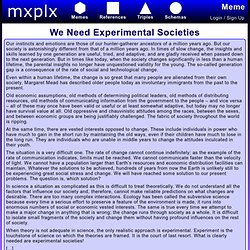
But our society is astonishingly different from that of a million years ago. In times of slow change, the insights and skills learned by one generation are useful, tried, and adaptive, and are gladly received when passed down to the next generation. But in times like today, when the society changes significantly in less than a human lifetime, the parental insights no longer have unquestioned validity for the young. The Economics of Star Trek. Star Trek economy: Federation is only mostly post-scarcity. You Are Cordially Invited (episode) The matriarch of the House of Martok challenges Worf and Dax's marriage.
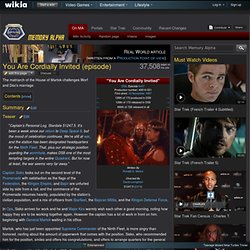
Summary Edit Teaser Edit. Captain Capitalism: Why Post-Scarcity Economics is Scary. Follow along if you will on a mental exercise in post-scarcity economics.
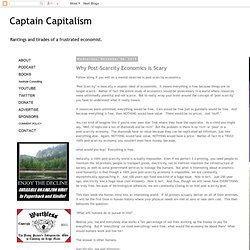
"Post Scarcity" is basically a utopian ideal of economists. It means everything is free because things are no longer scarce. Matter of fact the entire study of economics would be unnecessary in a world where resources were unlimitedly plentiful and not scarce. Star Trek Economics - Slashdot. Post scarcity - Technocracy Wiki. Post scarcity or post-scarcity describes a hypothetical form of economy or society, often explored in science fiction, in which things such as goods, services and information are free, or practically free.
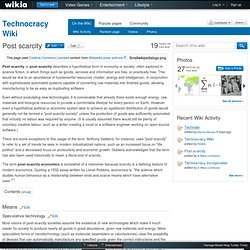
This would be due to an abundance of fundamental resources (matter, energy and intelligence), in conjunction with sophisticated automated systems capable of converting raw materials into finished goods, allowing manufacturing to be as easy as duplicating software. Even without postulating new technologies, it is conceivable that already there exists enough energy, raw materials and biological resources to provide a comfortable lifestyle for every person on Earth.
However even a hypothetical political or economic system able to achieve an egalitarian distribution of goods would generally not be termed a "post-scarcity society" unless the production of goods was sufficiently automated that virtually no labour was required by anyone. The Star Trek Economy. What is 'work', anymore?
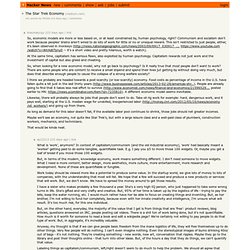
In context of capitalism/communism (and the old industrial economy), 'work' had basically meant a 'worker' getting paid to do some tangible, quantifiable task. E.g. I pay you $5 to move those 100 widgets. The Economics of Star Trek. To Boldly Go to There: The Proto-Post Scarcity Economy of Star Trek. Decoupling Productivity & Employment. Medieval peasants got more vacation time than you. Life for the medieval peasant was certainly no picnic.
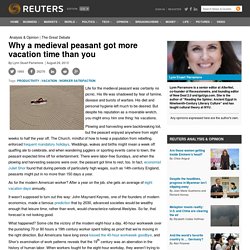
His life was shadowed by fear of famine, disease and bursts of warfare. His diet and personal hygiene left much to be desired. But despite his reputation as a miserable wretch, you might envy him one thing: his vacations. Plowing and harvesting were backbreaking toil, but the peasant enjoyed anywhere from eight weeks to half the year off. Who pays for minimum-wage hikes? The poor. Raising the minimum wage will reduce poverty.
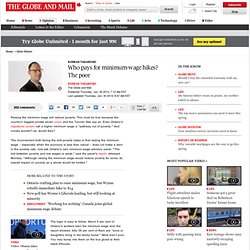
This must be true because the country’s biggest private sector union and the Toronto Star say so. Even Ontario’s registered nurses call a higher minimum wage a “pathway out of poverty.” And nurses wouldn’t lie, would they? The inconvenient truth facing the anti-poverty lobby is that raising the minimum wage – especially when the economy is less than robust – does not make a dent in the poverty rate. Just ask Ontario’s own minimum-wage advisory panel. The logic is easy to follow. Many other minimum-wage workers live in double-salary households that, together, earn middle-class incomes.
And what happens to these workers when the minimum wage goes up? Your Life in 2010 (written in 1990) Swiss to vote on 2,500 franc basic income for every adult. BERNE Fri Oct 4, 2013 3:57pm BST BERNE (Reuters) - Switzerland will hold a vote on whether to introduce a basic income for all adults, in a further sign of growing public activism over pay inequality since the financial crisis. A grassroots committee is calling for all adults in Switzerland to receive an unconditional income of 2,500 Swiss francs (1,741.51 pounds) per month from the state, with the aim of providing a financial safety net for the population.
Organisers submitted more than the 100,000 signatures needed to call a referendum on Friday and tipped a truckload of 8 million five-rappen coins outside the parliament building in Berne, one for each person living in Switzerland. Under Swiss law, citizens can organise popular initiatives that allow the channelling of public anger into direct political action. The country usually holds several referenda a year. The timing of the vote has yet to be announced, pending official guidance from the government. ($1 = 0.9000 Swiss francs) 21 hours. 21 hours A ‘normal’ working week of 21 hours could help to address a range of urgent, interlinked problems: overwork, unemployment, over-consumption, high carbon emissions, low well-being, entrenched inequalities, and the lack of time to live sustainably, to care for each other, and simply to enjoy life.
February 13, 2010 // Written by: Anna Coote, Head of Social PolicyJane Franklin, Project Co-ordinator and Researcher, Social Policy This report sets out arguments for a much shorter working week. It proposes a radical change in what is considered ‘normal’ – down from 40 hours or more, to 21 hours. The vision Moving towards much shorter hours of paid work offers a new route out of the multiple crises we face today. 21 hours as the new ‘norm’ Twenty-one hours is close to the average that people of working age in Britain spend in paid work and just a little more than the average spent in unpaid work.